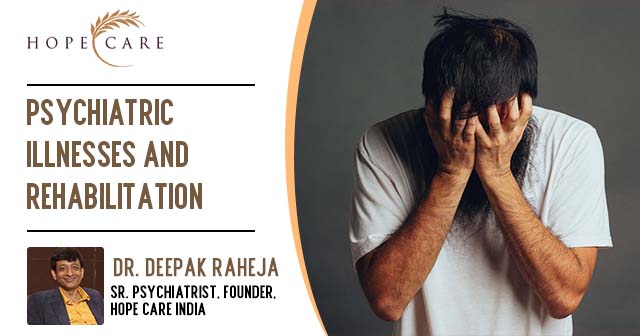Mental Health is fast becoming an area of concern for many, simply because a disturbed state of mind can be emotionally and physically taxing for both the patient and the caregivers. Not only this, the patient is also left exposed to the opinions and judgments of others, which further aggravates the situation.
To clear a few myths about Mental Health, it is important to understand the implication of mental illnesses. A mental infirmity is a pattern of behavior or thought process that causes dysfunctionality and is a stark deviation from the normal standard of daily functioning. These patterns may be continuous, relapsing and remitting. Holistically, a mental illness impacts how the patient thinks, feels and behaves. It is important to note that the absence of a mental illness is not a marker of Mental Health. Instead, Mental Health is defined as the ability of an individual to adapt and realize his/her own potential, cope with stressors effectively and be involved in the community.
There are several reasons that may lead to mental illnesses. However, research indicates that a predispositional vulnerability together with stressors from life experiences may trigger a mental illness. The vulnerability may appear in the garb of genetic, psychological, biological, or situational factors. Treatment for such afflictions is available in the form of both in-patient and out-patient services. The idea of treatment is to provide medication to encapsulate the symptoms so that the patient may feel some relief and thereafter induct the patient into therapy sessions which can further cement recovery. The idea of in-patient treatment must not be looked upon as frightening or daunting, simply because it’s the best course of action that families can take if the patient is severely unmanageable and there is a crisis situation that needs intervention. Rehabilitation is significantly different from admission in a hospital set up in the sense that it not only aims at stabilizing the patient and plummeting his/her violent tendencies but is engineered to address the core symptoms and use several treatment techniques to get the patient back to his maximum potential of functionality by relearning social skills and how to adapt to differing life situations.
In- patient treatment services are carried out in a safe, nurturing, compassionate environment at Hope Care India- Institute of Psychiatry, a rehabilitation center where state of the art treatment, using innovative techniques, is provided by licensed mental health professionals. At the facility, on admission, the patient is put into observation. Following detailed clinical evaluation and serial Mental Status Examinations, pharmacological interventions are initiated. The initial phase of treatment is to build rapport and the aim is to understand the patient’s attitude towards his/her illness. Technique of cathartic ventilation is further initiated to get an understanding of the patient’s past and this is more of an information gathering exercise. In the course of these therapy sessions confidentiality and unconditional support by the treating team is of utmost priority. Once stabilized the patient is started on the process of psycho-education and the patient’s denial about the illness is also addressed using rational explanations, drawing on the strong therapeutic alliance established in the initial stages of rapport building. Regular monitoring of the symptoms is carried out to keep a tab on the response of the active phase symptoms to pharmacotherapy with regard to improvement in the acute phase, the state in which the patient had initially presented himself on admission.
Further, in the next phase of treatment, the patient is provided with a concrete frame for his confusing experiences so as to enable him to logically process what had gone wrong with him and make him aware how to handle similar situations in the future, in of a relapse. A discussion about how the beliefs occurred- through inferences or cognitive distortions is also done with a review of the antecedents and identification of the misattributions. The patient is then assisted in developing alternative healthy thoughts by looking for alternative explanations and coping strategies. Identification of habitual stressful situations and cognitions and utilization of cognitive strategies to cope with them is also carried out. Dealing with social situations, the impact of his behavioral aberrations on his self esteem and the fear of sliding back to previous maladaptive patterns of behavior is also discussed and worked through. Therapy thereafter is geared to build stress management skills which are developed through a variety of relaxation methods that are implemented through meditation, yoga and spirituality.
The licensed, trained psychologists at the facility also assist in communication with family to help the patient build social networks supportive of change in his day to day life and bridge the interpersonal strain in the relationships with the family. Further, the patient’s participation in different activities such as dance movement therapy, pottery, art therapy, music therapy/Karaoke sessions and drama therapy is encouraged to help him emote better.
Towards the end of the stay thoughts about re-integrating into mainstream life are addressed with the patient and a review of the stressors, signs/triggers of stress and effective coping strategies is done. Further, a termination plan is developed. This plan includes an agreed upon procedure to handle emergencies and to be in touch with the treating team.
Dr. Deepak Raheja
Sr. Psychiatrist and Psychotherapist
President – Delhi Psychiatric Society
Director – Hope Care India
137, Uday Park,
New Delhi – 110049
Ph.: +91-98102 12377
Website: – www.hopecareindia.com

Hope Care established under the guidance of Dr. Deepak Raheja, is a Psychiatric Centre of excellence that endeavors to restore hope and well-being to individuals and families afflicted by mental ill-health through comprehensive treatment and rehabilitation services. Hopecare seeks to set benchmarks in innovative programs in treatment, care, and education.

